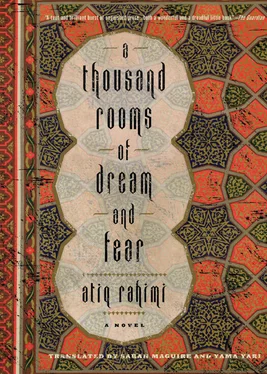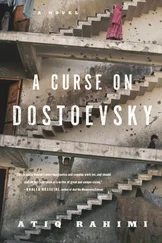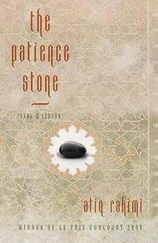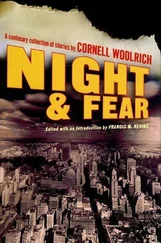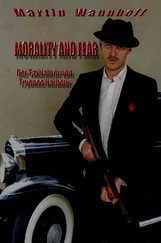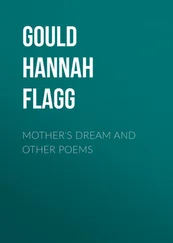“Run! Run!” my father shouts. “Shut up and stop crying! You unbeliever!”
I’m trying to work out how to escape from these octagons and rectangles without stepping onto the red background. The only possible way is to get through to the other side, to run and run till the carpet wears out under my feet. I run. I’m getting smaller and smaller with every turn. I run and I run. The patterns get bigger and bigger. As though I’m a part of the carpet’s design. I can feel the texture of the threads.
I only know I’m in the carpet because of its smell. I can’t see a thing. Just blackness. I can’t breathe. I can’t move.
“Tell him to keep still …”
I make out the sound of the trafficker’s voice over the monotonous thrum of the engine.
“Brother, keep still,” I hear a woman say. “We’re coming up to a checkpoint.”
I hold in my breath and my fear under the weight of the two bodies that sit on top of the carpet.
My head spins in the red-and-black labyrinth of the carpet.
As usual he sits with his hands laced across his bloated stomach, a look of complete indifference on his face.
“Hello, Father!”
No, I will not call him Father.
“Hello.”
“Hello.”
What next?
“So, what brings you here, then?”
Hiding his contempt with a laugh.
“You left your mother, your sister, and your brother behind to come and visit me?”
His arrogant sneer brings back the memory of the last thing I said to him before he walked out on us with his second wife in tow — a phrase that unfortunately escapes my mind as two people shift about on the carpet wrapped around me. The car comes to a halt. I leave my father with his disdain, his fat stomach, and his second wife. The back door of the car opens.
“Where are you going?” booms a voice.
The voice of the trafficker replies to the soldier: “Moosa-e-Logar.”
“Who are these people?”
“My two wives.”
I can feel the bayonet of a gun poking the carpet.
“Where are you taking this carpet?”
“It’s a wedding present for my brother.”
The door slams shut. The car moves off. The two people get off the carpet. A cold sweat films my entire body. They loosen the two pieces of cloth tucked into the ends of the carpet. I gasp for air.
My sweating face trapped inside the carpet heightens its smell. Such a familiar smell. The smell of our front room. Parwaneh used to play marbles on the black patterns of this carpet. Farid used to race his matchbox cars along its black lines … It was the best carpet in the house — my mother’s dowry, given by her father to take to her new husband’s house.
No. I will never go to see my father. I can’t possibly stay in Peshawar. I’ll go to Islamabad. But I don’t really like it there either. I’ll have to go somewhere else. Karachi or Lahore. I’ll get through this somehow or other. Soon I’ll be able to send for my mother, Parwaneh, and Farid.
I scratch my face on my mother’s dowry.
The car stops. The carpet with me wrapped up inside it is hauled out of the car and put on the ground. I roll over as it’s unrolled. The half-light of dusk hurts my eyes. I fill my chest with fresh air and the smell of the countryside. The trafficker drags my stiff frame free of the black patterns of the carpet. The car has pulled over by the side of a dirt track on top of a hill covered with thorn bushes.
“We’re taking a shortcut. We’ll be in the village in under an hour.”
The trafficker takes a packet of cigarettes from his waistcoat pocket and offers me one.
“Thanks, but I don’t smoke.”
Putting a cigarette between his lips, he lights up. Then he squats down on the carpet. Covered by their veils, his two wives leave the car to sit on the opposite corner of the carpet, turning their backs to us. I stand up.
The cigarette smoke and the trafficker’s voice steal over the golden slope of the hill.
“All being well, we’ll set off for Pakistan at dawn the day after tomorrow, by morning prayers. It’ll take two days. You …”
The low laughter of his two wives rises above his words.
“What are you laughing about?”
Both women immediately fall silent.
“You’ll stay in the village mosque,” the trafficker goes on. “But you mustn’t talk to a soul. By the way, do you have a student card?”
“No.”
“An ID card?”
“No, the soldiers took them off me.”
“Never mind. Do you have any papers at all?”
I go through my pockets mechanically. Other than two thousand Afghanis and a folded paper with my father’s address written on it, there’s nothing else.
My heart gives a sudden leap. Of happiness. Happiness about what? Mahnaz must have looked for my ID card and student card in the sewer … and found them … and my clothes … Will she hang on to them?
“Hey, Brother, snap out of it!”
I come back to the hill and our carpet, which is spread over the ground. On one corner sits the trafficker wearing his astrakhan hat. On the other, the two women with their blue and yellow veils … The setting sun merges their shadows with the carpet’s black patterns.
“Sorry, what did you say?”
“Do you know how to pray?”
“I think so, roughly …”
“Some nights the religious students get together and sleep in the mosque. They ask lots of questions of students like you from Kabul. But don’t worry. You’ll be all right unless you get into any kind of political discussions with them … It’s not a good idea to let on that you’ve been to university … Tell them instead that you left school after sixth grade and then got a job.”
I wonder if Mahnaz has washed my clothes? Will she give them to Moheb? No.
“Do you know anyone in Pakistan?”
“No.”
He says nothing. His narrow eyes, hidden under his thick eyebrows, follow the smoke curling from his cigarette into the fading light.
“Don’t you even have an address?”
“Is it important?”
“Yes. If anyone asks you, tell them you’ve already sent your wife and child to Pakistan and that they’re all there waiting for you.”
“My father is in Pakistan.”
“Then why did you say you didn’t know anyone there?”
“I don’t want to have anything to do with my father.”
“OK, that’s up to you. But it’s a good idea to have an address.”
No. I have no desire whatsoever to be beholden to my father.

“Why didn’t you bring your wife and child along with you?”
“My wife and child?”
Mahnaz and Yahya!
“It would be much easier if you were with your family.”
He throws away his cigarette butt. His voice is clear in the still evening air.
“Ya, Allah! Let’s go.”
The two women get off the carpet and head toward the car. The trafficker rolls up the carpet, empty of me, and tosses it into the back of the car. I get in too. The backseats of the car have been taken out. I sit on the rolled-up carpet. The women settle themselves in the front seat next to their husband.
Traveling downhill, the car kicks up a thick cloud of dust as it speeds around the bends in the road. The last red seconds of the day burnish the shoulders of the trafficker as he drives.
I ease myself off the carpet onto the metal floor of the car. I put my head on the carpet and kiss my mother’s footprints.
Once she’d left Mahnaz’s house, safely hidden under her veil, my mother went to the Shah-Do-Shamsira Mosque. There she tied a ribbon to the grill of the shrine and made a prayer for her son to get to Pakistan safely. My mother wept. But no one saw her tears. No one asked, “Mother, why are you crying?”
Читать дальше
